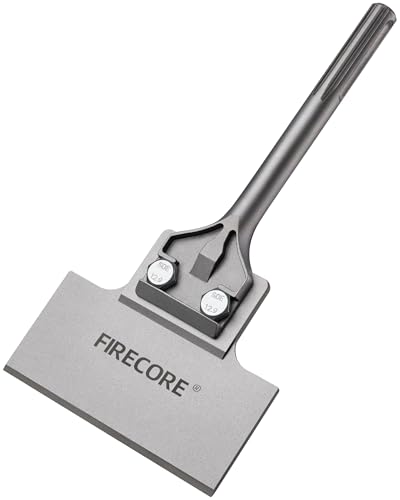




Rust stains on marble surfaces can be an unsightly and frustrating problem. Whether it’s from a metal object left on the surface or water that contains iron deposits, rust stains can be difficult to remove without damaging the marble. However, with the right techniques and products, you can effectively remove rust stains and restore the beauty of your marble surfaces.
One method for removing rust stains from marble surfaces is using a poultice. A poultice is a paste-like substance that is applied to the stain and left to sit for a period of time. It works by drawing out the rust from the marble. To create a poultice, mix equal parts of baking soda and water until it forms a thick paste. Apply the poultice to the stain, making sure to cover it completely. Cover the poultice with plastic wrap and let it sit for at least 24 hours. Once the time is up, remove the plastic wrap and scrape off the poultice with a plastic scraper. Rinse the area with water and dry it thoroughly.
Another effective method for removing rust stains from marble surfaces is using lemon juice and salt. Lemon juice is a natural acid that can help break down the rust stains, while salt acts as a mild abrasive. To use this method, squeeze fresh lemon juice onto the rust stain and sprinkle salt on top. Let the mixture sit on the stain for at least 30 minutes. Then, use a soft cloth or sponge to gently scrub the area in small circular motions. Rinse the area with water and dry it thoroughly. Repeat the process if necessary.
It’s important to note that rust stains on marble surfaces should never be removed with abrasive cleaners or tools. These can scratch and etch the marble, causing further damage. It’s also essential to test any cleaning method or product on a small, inconspicuous area of the marble before applying it to the stain. This will help ensure that the method or product is safe to use and will not damage the marble.
By using these effective methods, you can remove rust stains from marble surfaces and restore their natural beauty. Remember to always be cautious and test any method or product on a small area first. With patience and the right techniques, your marble surfaces can look as good as new.
Understanding Rust Stains on Marble Surfaces
Rust stains on marble surfaces can be a common problem, and it is important to understand why they occur in order to effectively remove them. Rust stains are caused by metal particles, such as iron, that come into contact with water or moisture on the marble surface. When these metal particles oxidize, they create a reddish-brown stain that can be difficult to remove.
Causes of Rust Stains on Marble Surfaces
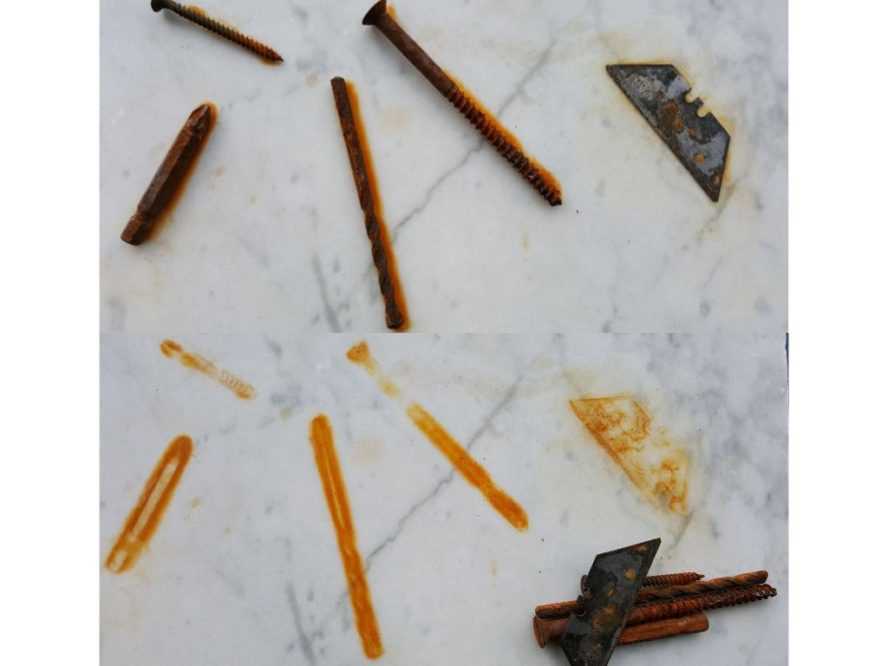
- Exposure to metal objects or tools that are left on the marble surface for extended periods of time.
- Leakage from pipes or plumbing fixtures that contain iron or other metals.
- Moisture from items placed on the marble surface, such as wet glasses or flowerpots.
- Usage of cleaning products that contain acids or other harsh chemicals.
Effects of Rust Stains on Marble Surfaces
Rust stains not only detract from the natural beauty of marble surfaces but can also cause damage if left untreated. The acidity of the rust can etch the marble, leaving a permanent mark. Additionally, prolonged exposure to rust stains can lead to further corrosion of the metal particles, which can exacerbate the staining.
Preventing Rust Stains on Marble Surfaces
- Avoid placing metal objects directly on marble surfaces. Use coasters or protective mats to prevent contact.
- Regularly inspect and maintain plumbing fixtures to prevent leaks.
- Ensure that any items placed on marble surfaces are dry and do not contain any metal components.
- Use cleaning products specifically designed for marble surfaces, avoiding those that contain acids.
Removing Rust Stains from Marble Surfaces
While prevention is key, if rust stains do occur on marble surfaces, prompt action is necessary to minimize damage. There are several effective methods for removing rust stains, including:
- Using a commercial rust remover specifically formulated for marble surfaces. Follow the instructions carefully and test the product on a small, inconspicuous area first.
- Creating a paste using baking soda and water and applying it to the stain. Allow the paste to sit for several hours before gently scrubbing with a soft-bristle brush.
- Applying a mixture of lemon juice and salt to the stain and allowing it to sit for a few hours. Rinse with water and gently scrub with a soft cloth.
- Using a poultice made from a mixture of powdered rust remover and water. Apply the poultice to the stain and cover it with plastic wrap. Allow it to sit overnight before removing and rinsing with water.
It is important to note that different methods may be more suitable for different types of marble surfaces. It is recommended to test any cleaning solution on a small, inconspicuous area before applying it to the entire stain.
Method 1: Using Lemon Juice
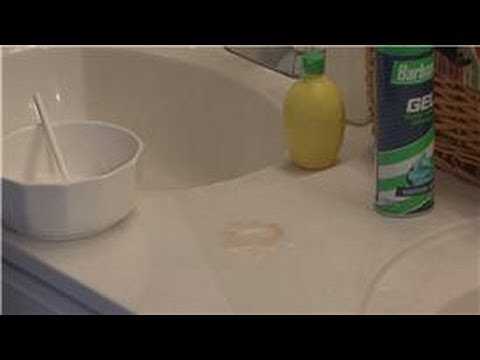
Lemon juice is a natural and effective way to remove rust stains from marble surfaces. The citric acid in lemon juice helps to break down the rust and lift it away from the marble.
Materials Needed:
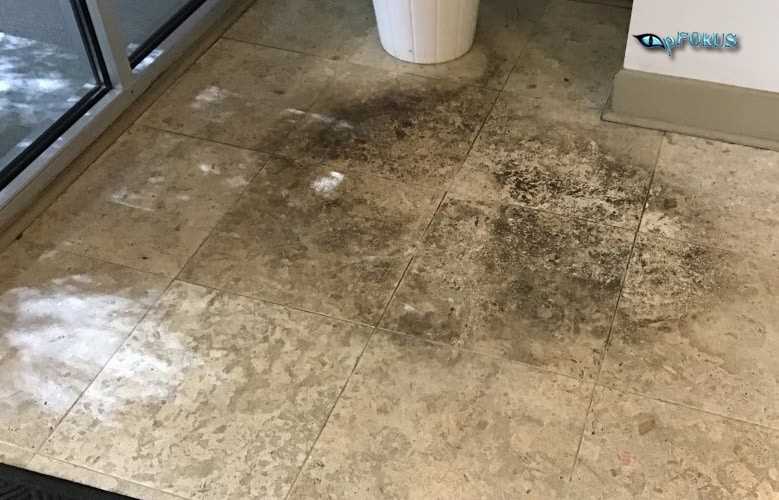
- Fresh lemons
- Water
- Spray bottle
- Cloth or sponge
Instructions:
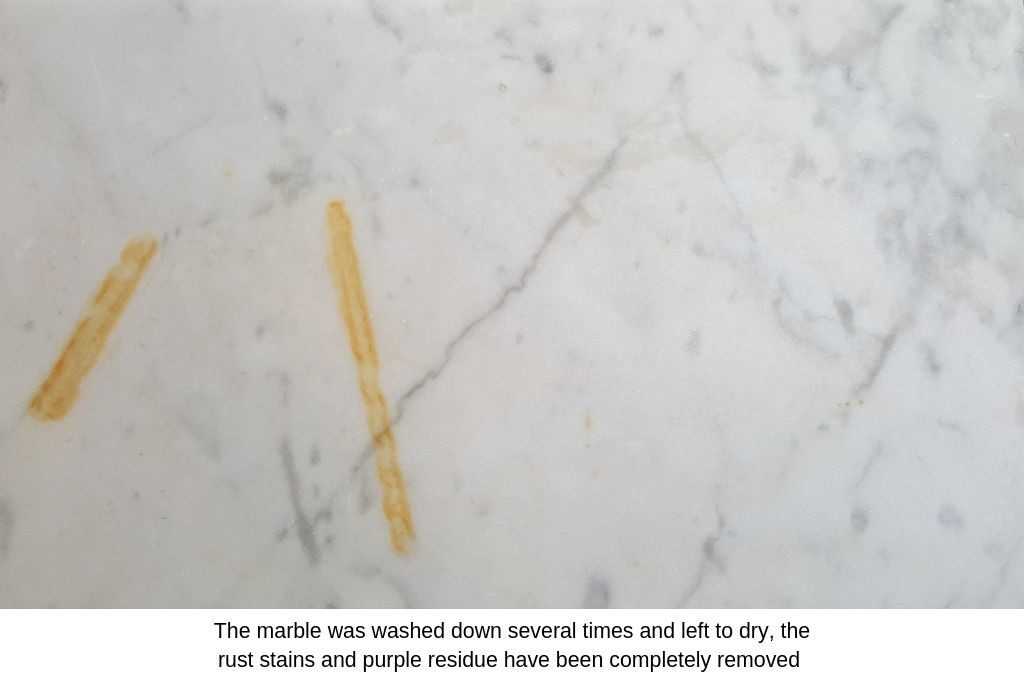
- Cut a fresh lemon in half.
- Squeeze the juice from the lemon into a spray bottle.
- Add an equal amount of water to the spray bottle and shake to mix.
- Spray the lemon juice mixture directly onto the rust stain on the marble surface.
- Let the lemon juice sit on the stain for about 10 minutes to allow the citric acid to work its magic.
- Gently scrub the rust stain with a cloth or sponge.
- Rinse the area with water to remove any remaining lemon juice.
- Dry the marble surface with a clean cloth.
Important Note: Lemon juice is acidic, so it’s essential to test it in a small inconspicuous area of the marble surface before using it on the rust stain. If there is no adverse reaction or damage to the marble, it is safe to proceed with this method.
Method 2: Applying Baking Soda Paste
If the rust stains on your marble surfaces are stubborn and difficult to remove, you can try using a baking soda paste to effectively remove them. Baking soda is a natural cleaner that can help break down the rust stains and lift them from the surface of the marble.
What You Will Need
- Baking soda
- Water
- Mixing bowl
- Soft cloth or sponge
Steps to Follow
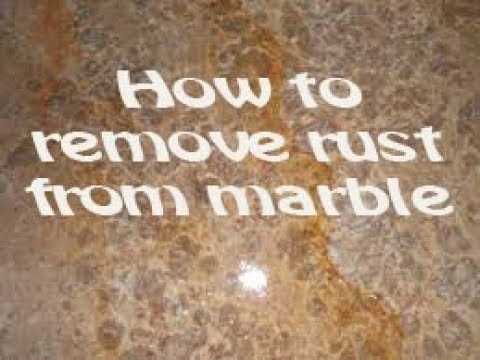
- Start by mixing baking soda with water in a mixing bowl to create a paste. The consistency of the paste should be thick enough to spread easily on the marble surface but not too runny.
- Apply the baking soda paste directly onto the rust stains on the marble surface.
- Gently rub the paste onto the stains using a soft cloth or sponge. Make sure to cover the entire stained area.
- Let the paste sit on the stains for 10-15 minutes to allow it to penetrate the rust.
- After the designated time, use a damp cloth or sponge to wipe away the baking soda paste from the surface of the marble.
- Rinse the marble surface with clean water to remove any residue.
- Inspect the marble surface for any remaining rust stains. If there are still stains present, you can repeat the process or try another method.
It is important to note that baking soda may have a slight abrasive effect, so you want to be gentle and avoid scrubbing too hard to prevent any damage to the marble surface.
Method 3: Utilizing Vinegar Solution
Vinegar is a highly effective natural solution for removing rust stains from marble surfaces. Its acidic properties help to break down the rust particles and lift them from the surface, leaving your marble stain-free and restored to its original beauty. Here’s how you can utilize vinegar to remove rust stains from marble:
- Mix equal parts of white vinegar and water in a spray bottle. Shake well to ensure the solution is thoroughly combined.
- Spray the vinegar solution directly onto the rust stain, ensuring it is fully saturated.
- Allow the solution to sit on the stain for approximately 5-10 minutes. This will give the vinegar time to break down the rust particles.
- Using a soft bristle brush or sponge, gently scrub the stained area in a circular motion. Avoid using any abrasive materials or scrub brushes, as they can scratch the marble surface.
- Rinse the area with clean water to remove the vinegar solution and any loosened rust residue.
- If the stain persists, repeat the process until the rust stain is completely removed.
Note: While vinegar is generally safe to use on marble surfaces, it is always recommended to test the solution on a small, inconspicuous area first to ensure it does not cause any damage or discoloration.
| Pros | Cons |
|---|---|
|
|
Method 4: Implementing Hydrogen Peroxide
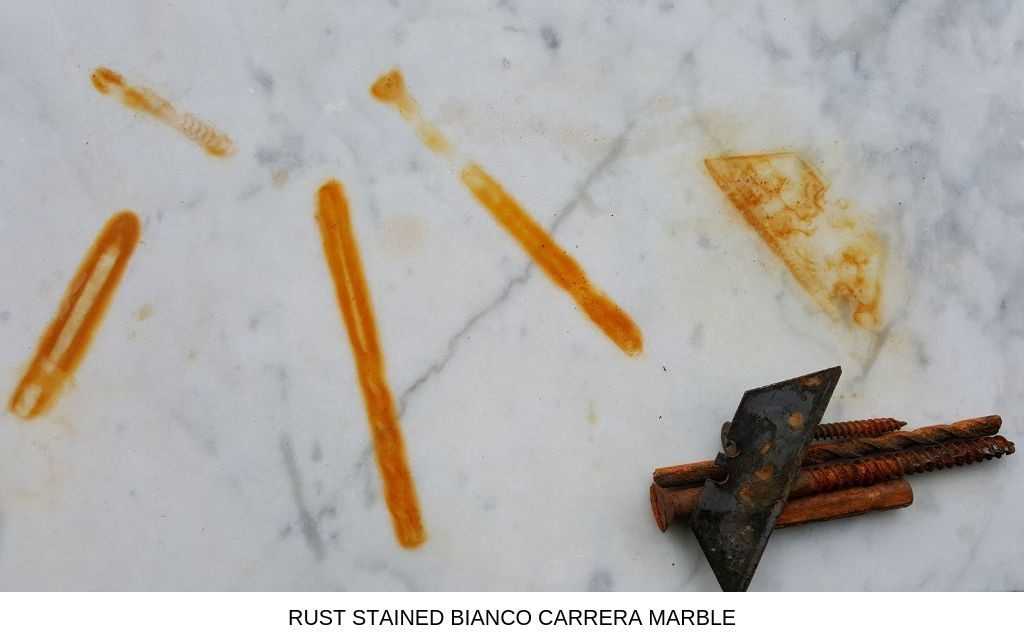
If the rust stain on your marble surface is stubborn and difficult to remove, you can try using hydrogen peroxide as an effective cleaning agent. Follow these steps to implement this method:
- Start by protecting yourself with proper safety precautions. Wear gloves to protect your hands and ensure proper ventilation in the area where you’ll be working.
- Make a cleaning solution by mixing equal parts hydrogen peroxide and water. You can use a spray bottle for easy application.
- Spray the cleaning solution directly onto the rust stain. Make sure to cover the entire affected area.
- Allow the solution to sit on the rust stain for about 10-15 minutes. This will give the hydrogen peroxide enough time to break down the rust particles.
- Using a soft cloth or sponge, gently scrub the rust stain in a circular motion. Apply moderate pressure, but be careful not to scratch the marble surface.
- Rinse the area thoroughly with clean water to remove any residue from the cleaning solution. Repeat the process if necessary.
- Dry the marble surface with a clean towel to prevent any water spots or streaks.
Note: Hydrogen peroxide is a mild bleaching agent, so it’s important to test it on a small, inconspicuous area of the marble before using it on the rust stain. This will ensure that it doesn’t cause any discoloration or damage to the surface.
By following these steps, you can effectively remove rust stains from marble surfaces using hydrogen peroxide.
Method 5: Engaging Commercial Rust Stain Removers
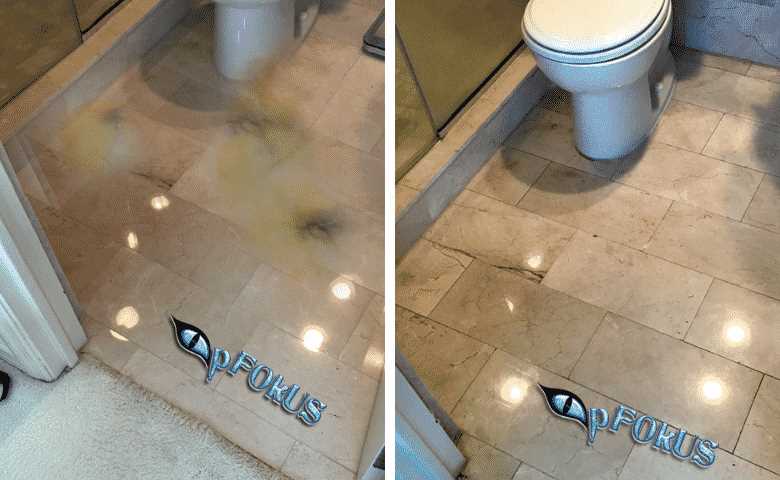
Commercial rust stain removers can be an effective option for removing stubborn rust stains from marble surfaces. These products are specifically formulated to break down rust and can often provide quicker results than homemade remedies. When using commercial rust stain removers, it’s important to follow the manufacturer’s instructions and take necessary safety precautions.
Steps:
- Choose a reputable commercial rust stain remover that is safe to use on marble surfaces.
- Read the product’s instructions thoroughly before starting the removal process.
- Wear protective gloves and goggles to prevent any potential skin or eye irritation from the chemicals.
- Clean the affected area with a mild soap and water solution to remove any surface dirt or debris.
- Apply the commercial rust stain remover directly to the rust stain, following the manufacturer’s recommended amount.
- Allow the product to sit on the stain for the specified amount of time. This will vary depending on the product.
- Gently scrub the area using a soft-bristled brush or sponge to help loosen the rust stain.
- Rinse the area thoroughly with clean water to remove any residue from the stain remover.
- Dry the surface with a clean towel.
- Inspect the area for any remaining rust stains. If necessary, repeat the process until the stains are completely removed.
Remember to always test any chemical product on a small, inconspicuous area of the marble surface before using it on the visible stains. This will ensure that the product does not cause any damage or discoloration to the marble.
If the rust stains persist or if you are unsure about using commercial rust stain removers on your marble surface, it is recommended to seek professional assistance from a marble cleaning and restoration specialist.
FAQ
What are some effective methods for removing rust stains from marble surfaces?
There are several methods that can effectively remove rust stains from marble surfaces. One common method is to create a paste by mixing baking soda and water, applying it to the stain, and leaving it for a few hours before scrubbing it off. Another method involves using lemon juice or vinegar to dissolve the rust stain, followed by scrubbing with a soft cloth or sponge. Another option is to use a commercial rust remover specifically designed for marble surfaces.
Is it safe to use baking soda on marble surfaces?
Yes, baking soda is safe to use on marble surfaces. It is a mild abrasive that can help gently remove rust stains without damaging the marble. However, it is important to mix the baking soda with water to form a paste and avoid scrubbing too harshly. Additionally, always test a small, inconspicuous area of the marble before applying the baking soda paste to the entire stain.
Can lemon juice or vinegar damage marble surfaces?
Lemon juice and vinegar are acidic substances that can potentially etch or dull the surface of marble if left on for too long or used in high concentrations. However, when used properly, they can be effective at removing rust stains from marble surfaces. It is recommended to dilute the lemon juice or vinegar with water and to rinse the marble thoroughly after removing the rust stain to minimize any potential damage.
Are there any precautions to take when using a commercial rust remover on marble surfaces?
When using a commercial rust remover on marble surfaces, it is important to read and follow the instructions provided by the manufacturer. Some commercial rust removers may contain harsh chemicals that can damage marble, so it is crucial to test the product on a small, inconspicuous area of the marble first. Additionally, it is recommended to wear gloves and protective eyewear when handling and applying the rust remover to avoid any potential skin or eye irritation.
What should I do if the rust stain on my marble surface is stubborn and won’t come off?
If the rust stain on your marble surface is stubborn and won’t come off with the methods mentioned above, you may need to seek professional help. Marble is a delicate and expensive material, so it is best to leave the removal of stubborn rust stains to experts who have experience and knowledge in handling such issues. They may use specialized techniques and products to safely and effectively remove the stain without causing any further damage to the marble.










